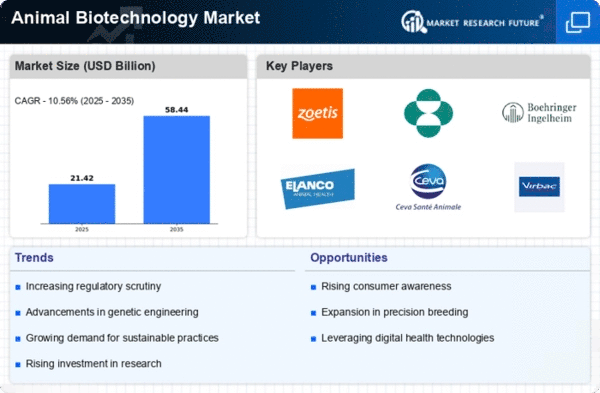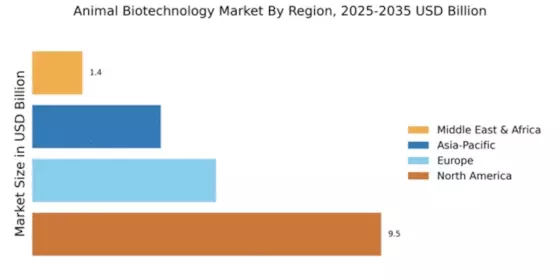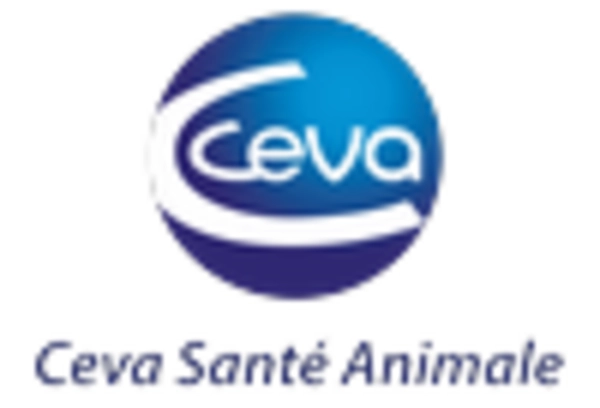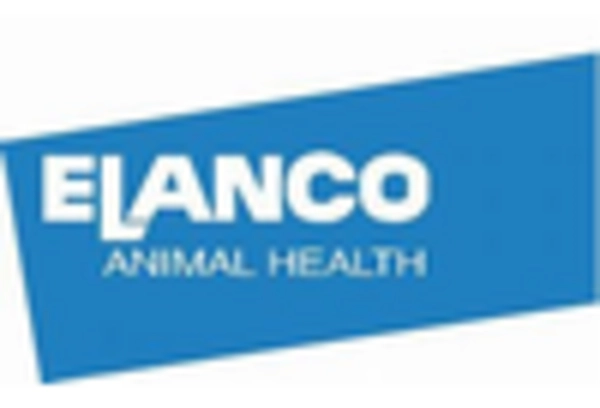Market Growth Projections
The Global Animal Biotechnology Market Industry is projected to experience substantial growth over the next decade. With an estimated value of 19.4 USD Billion in 2024, the market is anticipated to reach 58.4 USD Billion by 2035. This growth trajectory indicates a compound annual growth rate (CAGR) of 10.56% from 2025 to 2035, reflecting the increasing integration of biotechnology in animal agriculture. Factors such as rising demand for animal-derived products, advancements in genetic engineering, and a focus on animal health and welfare are likely to contribute to this robust market expansion.
Emerging Markets and Globalization
The Global Animal Biotechnology Market Industry is witnessing growth in emerging markets, where increasing urbanization and rising incomes are driving demand for animal products. Countries in Asia-Pacific and Latin America are particularly notable for their expanding middle classes, which are shifting dietary preferences towards meat and dairy consumption. This trend is likely to create new opportunities for biotechnology applications in these regions, as producers seek to enhance productivity and meet consumer expectations. The globalization of food supply chains further amplifies this demand, suggesting a promising outlook for the market as it adapts to diverse regional needs.
Focus on Animal Health and Welfare
The Global Animal Biotechnology Market Industry is increasingly influenced by a heightened focus on animal health and welfare. Consumers are becoming more aware of the ethical implications of animal farming, leading to a demand for biotechnological solutions that promote better health outcomes for livestock. Innovations in vaccines, diagnostics, and therapeutics are essential for preventing diseases and ensuring the well-being of animals. This trend aligns with regulatory frameworks that emphasize animal welfare standards. As a result, investments in animal health biotechnology are likely to rise, further driving market growth and enhancing the overall sustainability of animal agriculture.
Advancements in Genetic Engineering
Technological innovations in genetic engineering significantly propel the Global Animal Biotechnology Market Industry. Techniques such as CRISPR and gene editing enable the development of genetically modified organisms that exhibit desirable traits, such as disease resistance and improved growth rates. These advancements not only enhance livestock productivity but also contribute to food security. As the global population continues to rise, the need for efficient food production systems becomes increasingly critical. The market is expected to grow at a CAGR of 10.56% from 2025 to 2035, indicating a robust future for genetic engineering applications in animal biotechnology.
Rising Demand for Animal-Derived Products
The Global Animal Biotechnology Market Industry experiences a surge in demand for animal-derived products, driven by increasing consumer preferences for meat, dairy, and other animal products. In 2024, the market is projected to reach 19.4 USD Billion, reflecting a growing population and changing dietary habits. This trend is likely to continue, with projections suggesting that by 2035, the market could expand to 58.4 USD Billion. The rising demand for high-quality and safe animal products necessitates advancements in biotechnology, which can enhance productivity and sustainability in animal agriculture.
Regulatory Support and Funding Initiatives
Governmental support and funding initiatives play a crucial role in shaping the Global Animal Biotechnology Market Industry. Various countries are implementing policies that encourage research and development in animal biotechnology, recognizing its potential to address food security and agricultural challenges. For instance, funding programs aimed at fostering innovation in biotechnology can lead to breakthroughs in animal health and production efficiency. This supportive regulatory environment is expected to facilitate market expansion, as stakeholders are more likely to invest in biotechnological solutions that align with national agricultural goals and sustainability objectives.


















